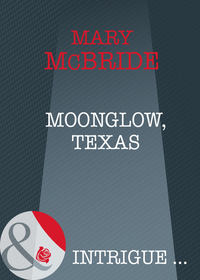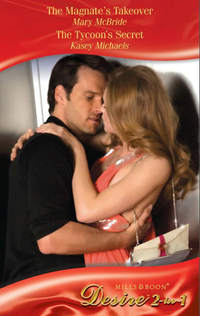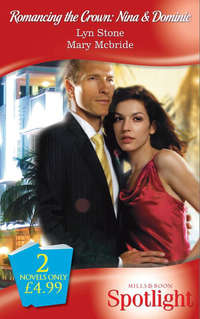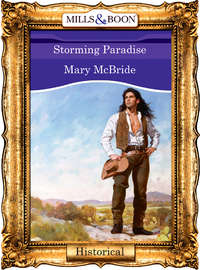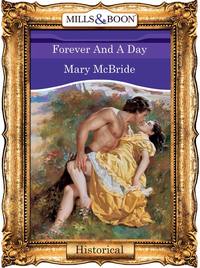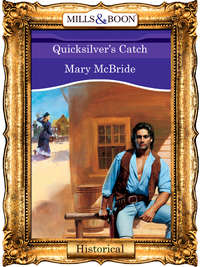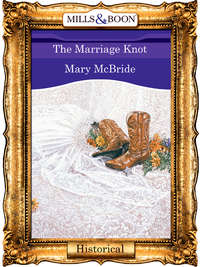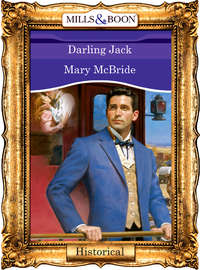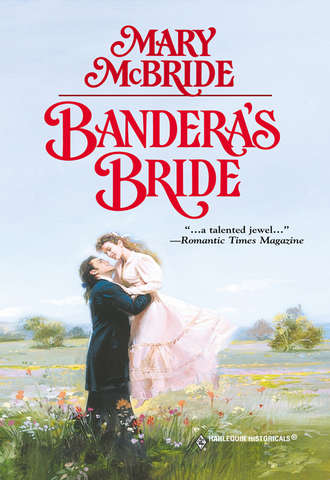
Полная версия
Bandera's Bride

“I’m as fat as a sow. I know. And just as ugly.”
Her lower lip jutted out now in a full-fledged pout. “How unchivalrous of you to point that out.”
“Oh, no, querida.” His hands moved to cup her face, and the grin he’d been sporting was replaced by an expression of such earnest warmth that it fairly melted Emily’s heart. “A woman can never look ugly when she is brimming with life.”
Emily couldn’t break her gaze from those incredibly warm eyes. She didn’t want to. All of a sudden, instead of feeling like an awkward, overgrown sow, she felt like a swan, all featherlight and full of grace.
“Go,” he said. “Before I kiss you.” He angled his head toward the door of the saloon.
Suddenly Emily couldn’t think of anything in the world she wanted more than for John to kiss her….
Dear Reader,
Much of the beauty of romance novels is that most are written by women for women, and feature strong and passionate heroines. We have some stellar authors this month who bring to life those intrepid women we love as they engage in relationships with the men we also love!
Mary McBride’s poetic voice and powerful stories have won her numerous historical romance fans. And with the recent debut of her first contemporary romance from Silhouette, Mary’s audience keeps expanding. Bandera’s Bride is a heartwarming Western about two misfits who fall in love through letters. But when Southern belle Emily Russell, now pregnant, decides to travel to Texas to propose marriage to her letter lover, she finds only his half-breed partner, John Bandera. Neither dreams of achieving the other’s love—only they magically do.
Susan Amarillas brings us a new Western, Molly’s Hero, a tale of forbidden love between a—married?—female rancher and the handsome railroad builder who desperately needs her land. In The Viking’s Heart, a medieval novel by rising talent Jacqueline Navin, Rosamund Clavier is the proud noblewoman who falls in love with the fierce Viking sent to escort her to her own arranged marriage. Will she choose love or duty?
And don’t miss My Lady’s Dare, by the sensational Gayle Wilson. This Regency-set tale will grab you and not let go as the Earl of Dare becomes fascinated by another man’s mistress. Nothing is as it seems in this dangerous game of espionage and love!
Enjoy! And come back again next month for four more choices of the best in historical romance.
Sincerely,
Tracy Farrell,
Senior Editor
Bandera’s Bride
Mary McBride

www.millsandboon.co.uk
Available from Harlequin Historicals and MARY MCBRIDE
Riverbend #164
Fly Away Home #189
The Fourth of Forever #221
The Sugarman #237
The Gunslinger #256
Forever and a Day #294
Darling Jack #323
Quicksilver’s Catch #375
Storming Paradise #424
The Marriage Knot #465
Bandera’s Bride #517
Other works include:
Harlequin Books
Outlaw Brides
“The Ballad of Josie Dove”
Silhouette Intimate Moments
Just One Look #966
For the men in my life—Leslie, Loren and Merit
Contents
Prologue
Chapter One
Chapter Two
Chapter Three
Chapter Four
Chapter Five
Chapter Six
Chapter Seven
Chapter Eight
Chapter Nine
Chapter Ten
Chapter Eleven
Chapter Twelve
Chapter Thirteen
Chapter Fourteen
Chapter Fifteen
Chapter Sixteen
Chapter Seventeen
Chapter Eighteen
Chapter Nineteen
Epilogue
Prologue
Texas, 1866
It wasn’t a perfect partnership, the one between the Southerner, Price McDaniel, and the half-breed, John Bandera. It was as far from perfect as the rugged landscape of south Texas was from the gentle hills of Russell County, Mississippi. The two men had almost nothing in common.
Physically, they were as mismatched as daylight and dark. McDaniel was a slight man with hair as fair as corn silk. John Bandera, the dark half of the equation, had bronze skin and cast-iron black hair. Part Comanche, part Mexican, and part anybody’s guess, he was imposing in size alone, but it was his amber, catlike gaze that kept most men at a wary distance. His partner, Price McDaniel, was usually too drunk to be cautious.
When drunk, which was often, Price was a man given to lengthy proclamations uttered in a drawl that was one third Mississippi and the rest pure Tennessee whiskey. John Bandera rarely drank and said little in return.
The two men didn’t even particularly like each other. Still, they were partners, bound by a single and uncharacteristic burst of heroism at the Cimarron Crossing in 1864 when Lieutenant McDaniel had saved Scout Bandera’s life.
Despite their differences, the partnership—thus far—had proven beneficial for both of them. The year before, after being mustered out of the army, Price had had more money than good sense, and he had wanted to build a ranch in Texas to rival anything back in Russell County, Mississippi, no matter that he didn’t know a longhorn from a mule deer or a heifer from a steer.
John had been broke, physically as well as financially. The army had no use for a scout on crutches and John had needed a place to heal. He’d owed Price for saving his life, and he figured one year of his sweat and expertise would cancel his debt to the Southerner.
Now that year was up.
The house was finally finished. Its pine floors and door frames glowed a rich gold beneath a first coating of shellac. The place still smelled of sawdust, but that raw odor mingled now with the fragrance of oiled walnut and rich leather.
Price McDaniel’s furniture—two wagon loads all the way from Mississippi—had arrived earlier in the day. There were wardrobes, chairs and sofas, dressers, mirrors, all manner of beds and bedding. There was one big swivel chair that matched one enormous desk. And there had also been one cream-colored letter tucked neatly inside the center drawer.
Price had been on a tear ever since finding it. He had read the letter at least a dozen times, and had looked at the enclosed carte de visite long enough and hard enough to wear the chemicals right off the little photograph. At the moment, the picture lay facedown on the desktop, the envelope was strewn in little pieces on the floor, and Price was fashioning the letter itself into a rough approximation of a bird.
“Ladies,” he slurred as he folded one edge of the vellum, then crimped it, “especially those of the Southern persuasion, are like gardenias. Have you ever seen a gardenia, John?”
As lamplight glanced off the fresh pine paneling, it made the half-breed’s eyes all the more amber when he looked up from the list of supplies he was composing—goods intended to see his soon-to-be ex-partner through the coming winter.
“Nope,” he replied, about to add that he’d never seen a lady, either. Instead he returned his attention to his list, knowing Price would go on with his drunken declamation whether anyone was listening or not.
He did, interspersing his words with wet, laborious sighs.
“They’re all pale and creamy and petal-soft. Dewy and cool to the touch. Only you can’t. Touch them, I mean. Southern ladies are just for the looking. Touch them, and they bruise. Just like a gardenia. You remember that, John, if you ever have the supreme misfortune to meet up with one of them.”
“I’ll keep it in mind.” His chances of meeting up with a lady, Southern or otherwise, were slim, slimmer, and none, John thought. The notion that he’d ever have the opportunity to touch one struck him as ludicrous. He’d learned early and at the painful end of a switch not to want what he couldn’t have. Ladies were high on that particular list.
He made a last notation now on his own list, then parked the pencil stub behind his ear. “If you’re all done ranting, Price, maybe we could go over a few things.”
The Mississippian smiled sloppily as he lifted the folded letter, held it shoulder-high a second, then launched it across the room. The pale paper flew like a snub-nosed, stubby-winged owl before it plummeted to the floor beside John’s moccasined foot.
He ignored it a moment, then picked it up and smoothed it out across his knee, instantly intrigued by the daintiness of the penmanship, trying to imagine the pale, fine-boned fingers that had drafted each delicate word.
He read not the whole, but separate, beautifully crafted words and phrases here and there. How delighted we all were. Sympathetic to your dire circumstances as a prisoner of war. Russell County. Do remember. Forever your home.
His amber eyes flicked up to meet his partner’s. “You going back?”
Price chuckled softly as he filled his empty glass from the bottle near his elbow, then raised the glass in a wavering salute.
“Here’s to Russell County, Mississippi, where a Russell is always a Russell and everybody else is…everybody else.”
He downed half the whiskey, then continued. “And here’s to Miss Emily Russell. May she bloom and prosper in Russell County soil. Here’s to gardenias in all their pale and untouchable glory.”
Price drained his glass and thumped it down on the desktop. “Here’s to us, partner. And to the frigid day in hell that finds me back in Mississippi.”
“You’re staying.” It wasn’t a question so much as an acknowledgment. A disappointed one. John had hoped for a moment that Price would go home. It was where the man belonged, after all. So what if he had turned his back on the Confederacy in order to get out of a Yankee prison? He hadn’t been the only Rebel prisoner who’d put on a blue uniform and headed west as a Galvanized Yankee.
But he didn’t belong out West anymore. He belonged back home with well-bred gentlemen like himself and with ladies like gardenias. And he was damned lucky, in John’s estimation, to have a place where he belonged.
“I’m staying.” Price’s clenched fists banged hard on the desktop. “Russell County be damned, along with all the Russells in it.” He picked up the little carte de visite and, without even glancing at it, flicked it across the desk toward John. “Good riddance to them all.”
John’s dark hand shot out to catch the photograph before it fluttered to the floor. It felt warm in his palm, almost alive. He stared at its blank side a moment, as if hesitant to look at the face of the woman…no, the lady…whose delicate hand had composed the letter still lying on his leg. What face could be flawless enough? What pose perfect enough? What tilt of chin or hint of smile could be worthy of the lady in his head?
This one! His heart bunched up in his throat when he gazed at Emily Russell, and as his sun-bronzed thumb smoothed over the photograph, he wouldn’t have been at all surprised to see her lovely image begin to wither and fade. What was it Price had said? Touch them, and they bruise.
John had to clear his throat before he spoke, but there was still an unfamiliar, nearly ragged catch.
“She’s a lady, Price. You ought to write her back.”
“Like hell,” his partner snorted, replenishing his glass, sloshing whiskey over the rim. “Since when are you so concerned with proprieties?”
Since a minute ago, John wanted to say, but he merely shook his head and muttered, “It’s the right thing to do.”
Price rolled his eyes. “Well, you go on and write her, then, if you feel so strongly about it. Go on, John. Be my guest. Write the lady back.”
He did. Then, although he’d meant to leave when that first year was up, John Bandera hung around waiting for a reply.
When it came—addressed to Price—he wrote her back.
And waited again. And again.
Six years later, long after his drunken partner had pulled up stakes and disappeared, John Bandera was still there, still writing letters signed “Price,” still loving the lady so like a gardenia.
Chapter One
Mississippi, 1872
“Emily Russell, you are not leaving. I forbid it. Now, you put that suitcase down. Do you hear me? Put it down.”
“I do hear you, Dodie. You’re screeching like an owl, and I wouldn’t be a bit surprised if everybody in Russell County hears you.”
“You wouldn’t be doing this if your brother were here. After all Elliot’s done for you, too. How can you be such an ungrateful wretch?”
Emily shoved past her wailing sister-in-law, charged through the front door, and dropped her final piece of luggage on the verandah.
“There.” She shaded her eyes against the bright morning sun, searching past the long sweep of driveway toward the street beyond. “Now, where in blazes is Haley Gates? He promised me he’d be here by ten o’clock.”
“If I know Haley Gates,” Dodie muttered, “he’s probably facedown in the hay in somebody’s barn.” Then she reached for the leather handle of a carpetbag. “I’m taking this back inside.”
Emily jerked the bag away. “You’ll do no such thing. I’m going, Dodie. And that’s that.”
“To Texas!” The young woman threw up her hands. “Texas! Where you’ll be set upon by wild Indians. Maybe even scalped. Lord knows any savage would love to whack off those blond curls of yours.”
“I’ll be sure and keep my bonnet tied tight, then.” Emily peered down the street in the opposite direction. “I’ll scalp that Haley if he’s not here in two more minutes.”
Dodie sighed mightily, then sank into a high-backed wicker chair. “Elliot’s going to be beside himself when he gets back from New Orleans to find you’ve taken off like some thief in the night. You know that, don’t you? He’ll be furious. He feels so responsible for you.”
“It’s ten o’clock in the morning, Dodie, and I’m not a thief. I’m not a prisoner, either. At least not anymore.”
“A prisoner! What a spiteful thing to say, Emily, when all we’ve done is look out for your best interests since Mother and Father Russell passed away. Why, I’m sure those two must be fairly twirling in their graves right now, seeing what their foolish, dreamy daughter is up to.”
Emily almost laughed at that image of her prim and proper parents. But Dodie was probably right. If they knew what she was doing, her parents would most definitely spin in their shady little graves. As for being dreamy…Well, Dodie was probably right about that, too. But Emily wasn’t foolish. Not now, at least.
Dodie sighed again, louder and longer. “Oh, how I wish that nice Mr. Gibbons hadn’t gotten the croup and died. He was going to propose marriage, Emily. After all those years of being so shy and tongue-tied whenever he was around you, I simply know he’d worked up the courage to pop the question. I could see it in his eyes.”
“Perhaps,” Emily said. And she would have married Alvin Gibbons, too, she thought. She would have had to marry him, and then they would have lived unhappily ever after. Only now her longtime, flesh-and-blood suitor was dead and Emily was on her way to Texas to find a man she didn’t know in the flesh, but in letters. All those lovely letters.
“I’d like to scalp that no-good Price McDaniel for luring you away like this,” Dodie moaned.
“He didn’t lure me.” Emily almost laughed at her sister-in-law’s melodramatic despair. If anybody deserved to be melodramatic and despairing right now, it was Emily herself. “Price doesn’t even know I’m coming.”
“Well, that’s just fine and dandy. You’re traveling five thousand miles to see a man—a traitor, by the way—who may or may not even be there when you arrive.”
“It’s not five thousand miles. And Price is not a traitor. He did what he had to do, Dodie, to get out of that horrible Yankee prison camp. You know that.”
“He should have come home.”
Emily gave an indignant snort. “To what sort of welcome?”
They had had this argument before, a hundred times perhaps during Emily’s six-year correspondence with the self-exiled Price McDaniel. But what her sister-in-law failed to recognize was that, during those six years, Emily had fallen in love with the man. She hadn’t told a soul, though.
Well, that wasn’t quite true. She had confessed her love to Price in a ten-page, heartfelt letter she had written on New Year’s Eve, then sealed and mailed with such high hopes on the first day of 1872.
If you think me bold and brazen, dearest Price, then I am guilty as charged. Your Emmy loves you and would even be so bold as to propose a life together in the flesh rather just on paper. Send for me, Price. Oh, my dearest. Marry me.
His response had arrived, like clockwork, as all his previous letters had, and she had opened it with a brimming heart and trembling hands only to read his bitterly fond and conclusive farewell.
Someday I hope you can forgive me for misleading you. Dearest Emmy, I will not write again.
That evening she had wept on Alvin Gibbons’s shoulder, and he—suddenly not so shy—had consoled her gently, if not a bit too thoroughly, just two weeks before he sickened and died.
“For God’s sake,” Dodie exclaimed now. “You barely knew Price when he was here and you haven’t heard a word from him in months. How do you know he’s still in Texas? How do you know he’s still alive? Or that he even wants to see you?”
“I know,” Emily lied, when what she knew was only that she had to leave. Today. Now. It wouldn’t be long before everyone in Russell County knew that she—poor Emily, the dreamy spinster, the maiden lady whose shy suitor had passed away three months ago—was going to have a child.
Haley Gates had a tendency to spit when he talked, in part from his habit of dipping snuff and in part from the absence of front teeth, so while Emily sat beside him on the wagon seat, she was glad he kept his face forward and his eyes on the backsides of his mules. She was glad, too, that he had lapsed into silence after an hour-long discourse on who was up to what in Russell County. The man took extraordinary pleasure in pawing through almost everybody’s dirty laundry. Almost everybody. Her own secret, she supposed, was still safe.
But if he said one more time just how brave she was for going out West alone, Emily couldn’t decide whether she was going to hit him or to ask him to turn the wagon around and take her home. She didn’t feel brave. She felt sick and scared to death.
Even so, there was no going back. Her decision wasn’t based so much on the scandal her family would have to endure or her own sorry future as a fallen woman, but on the pitiful prospects for a child born out of wedlock in an unforgiving community.
She glanced at the unfortunate man beside her. Haley Gates was nearly forty years old, but tongues still wagged about his illegitimate origin, and more people than not referred to him as Sally Gates’s bastard boy.
That wouldn’t happen to her child, by God. He or she was going to have a chance in this unforgiving world. Emily meant to see to that, no matter how sick or scared she felt. No matter how ashamed she felt for closing her eyes that night and pretending Alvin Gibbons was the man she loved, that his hands were Price McDaniel’s hands, that his kisses were the ones she craved, and that he loved her as desperately as she loved him.
“…friends or kinfolk?”
With a jolt, Emily realized that Haley had been speaking to her and she hadn’t comprehended a single word he’d said. She apologized.
“Oh, that’s all right, Miss Emily. A mind tends to wander on a pretty day like this.” He spat, this time intentionally, over the side of the wagon. “I was just asking who you planned on visiting in Texas. I didn’t know any Russells had ever left the county.”
“Only my uncle Randolph,” she said. “And he went east to Washington, D.C.”
“So you’re visiting a friend, then?”
“Yes. A friend.”
What did it matter now, telling Haley the truth? she wondered. Knowing Dodie’s proclivity for gossip, she was certain the entire Ladies’ Aid Society already knew her destination. And if the venerable LAS knew, then everybody in seven counties was sure to know within a week.
“I’ve been corresponding with Price McDaniel,” she said as matter-of-factly as she could. “He chose to stay out West after the war to raise cattle. And he’s cordially invited me to visit his ranch.”
Haley took one hand from the reins in order to scratch his head. “McDaniel. McDaniel. That doesn’t strike any particular bell.”
“Well, he’s been gone for quite some time. He had no sisters or brothers, and his parents passed away several years ago. They lived in that big white house on Solomon Street.”
“Oh, those McDaniels.” Haley slapped his knee. “I remember them, all right. Why, I even helped tote all that furniture they shipped to Texas.”
“Yes. I remember, too.”
What Emily remembered was slipping an envelope into a drawer of an enormous walnut desk, and then a month later being surprised by a thoughtful reply, written in a bold and quite masculine hand. The tone of the letter had been serious and almost poetic, which surprised her even more, because her memory of Price had been that of a laughing and rather cavalier young man, given more to pranks than poetry.
How the war had changed him, she had thought at the time, and then with each successive letter, she found herself increasingly glad that the callow youth she recalled had been forged into such a strong yet gentle man.
Then, month by month, letter by letter, Emily had fallen in love. It had been her distinct impression, even her devout belief, that Price’s feelings for her were of an equal depth and weight. Dear Miss Russell had long ago been replaced by Dear, then Dearest Emily. The second to the last letter—the one to which she had responded with such candor and passion—had begun My Dearest Emmy.
That one—the one with half its inked words dripping down the pages from her happy tears—was now wrapped in a lace hanky and tucked deep inside the reticule on her lap. Price’s other letters, tied with silk ribbons, a different color for every year, were secure in her leather valise. And although she had packed most of her clothes and other belongings for the trip to Texas, nothing really mattered but the letters that had come to be her most valuable possessions, indeed her only priceless worldly goods.
“All that furniture,” Haley murmured, shaking his head. “I sure do remember now that you mention it, Miss Emily. Wonder if all them dressers and desks and whatnots made it to Texas all right. Did you ever hear?”
Emily smiled wistfully. “The desk arrived, Haley. That’s all I know for sure.”
The levee in Vicksburg was crowded when they arrived later that afternoon. Haley’s mule-drawn wagon wasn’t the worst-looking vehicle at the steamboat landing, but it didn’t rank far above most of the produce wagons parked there. For one bleak moment, Emily felt that she had come down a peg or two in the world until she reminded herself of her fallen status and decided she was lucky indeed to even be able to afford a wagon ride, not to mention the passage she had booked on the Memphis Zephyr, whose smokestacks were already billowing with steam.
“I must hurry, Haley,” she said, clambering down from the wagon seat before he could come to her aid, then reaching for the valise that held her precious letters. “If you’ll carry my other bags to the gangplank, I’d be most appreciative.”
Emily hurried across the cobblestones to show her ticket to the captain.


